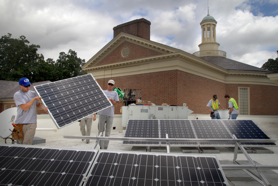North Carolina Interfaith Power & Light, a program of the Council, is proud to announce that this year has been a banner year for faith communities in North Carolina to go solar. Three faith communities have successfully installed solar projects on their property in the past few months, Myers Park Baptist Church in Charlotte (picture above), Temple Emmanuel in Greensboro, and the Montreat Conference Center in Montreat. First Congregational United Church of Christ installed their solar panels in February.
We know that people of faith embrace their cathedrals, churches, mosques, synagogues, and temples as sacred. In the best of scenarios, houses of worship hold a community together and serve as a central focus for community life in general. Symbolically and in reality, people of faith strive for their sacred spaces to be the center of good works and community service.
As people of faith have become more deeply engaged in environmental stewardship they have begun to recognize that rapidly accelerating climate change has become one of the greatest challenges that civilization has ever faced. Some are doing energy audits and making steps to reduce energy use, or designing new buildings and additions that are highly energy efficient. These actions are taken out of love for the beauty and goodness of God’s work and the desire to observe our responsibility to preserve and protect it.
NC IPL believes that it is important for congregations to be leaders in their communities by installing solar systems, and we are committed to helping forge this precedent-setting path forward. Seeing solar panels on a house of worship becomes an iconic marker to the broader community, a demonstration of the congregation’s love of the Creator and creation, and it shows a commitment to change our relationship to energy, especially fossil fuel use. It becomes a moral statement, a rejection of our use of fossil fuels and the damage that such use brings to all in our shared earth community. These solar billboards for care of creation express a clear commitment that the broader human community cannot ignore.
Each faith community mentioned above used a different approach for financing their projects. You can read more about Solar for Congregations on our Solar Clearinghouse document.
-Richard Fireman, Public Policy Coordinator, NC Interfaith Power & Light

